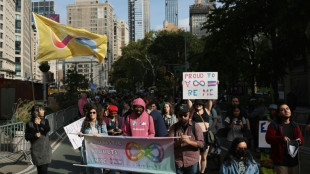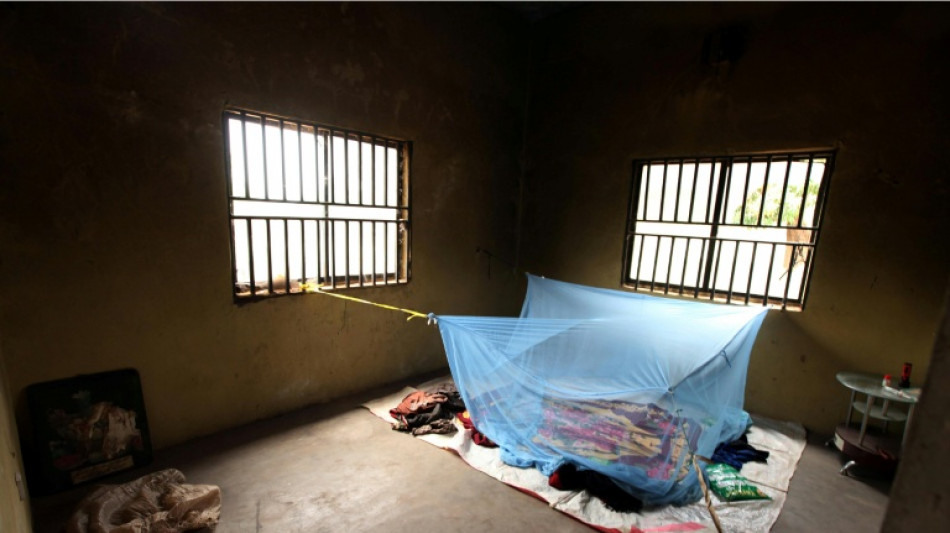
-
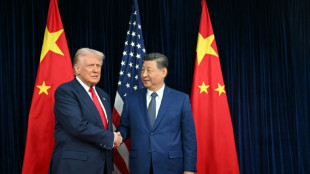 Asia markets fluctuate as investors mull Trump-Xi talks
Asia markets fluctuate as investors mull Trump-Xi talks
-
Trump, Xi ease fight on tariffs, rare earths
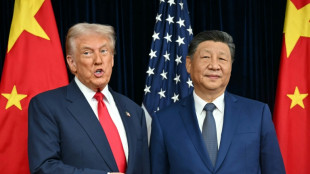
-
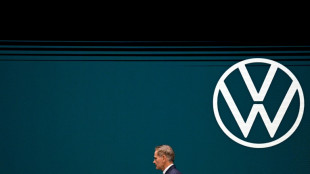 Volkswagen posts 1-billion-euro loss on tariffs, Porsche woes
Volkswagen posts 1-billion-euro loss on tariffs, Porsche woes
-
'Fight fire with fire': California mulls skewing electoral map

-
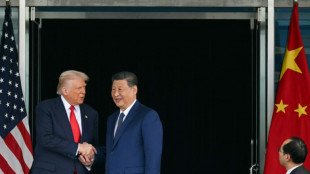 Fentanyl, beans and Ukraine: Trump hails 'success' in talks with Xi
Fentanyl, beans and Ukraine: Trump hails 'success' in talks with Xi
-
'Nowhere to sleep': Melissa upends life for Jamaicans
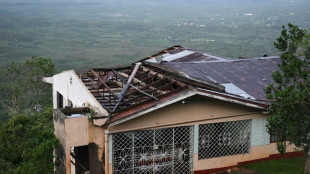
-
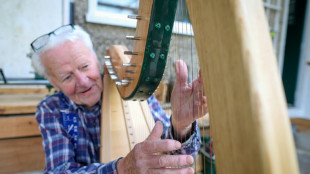 Irish octogenarian enjoys new lease on life making harps
Irish octogenarian enjoys new lease on life making harps
-
Tanzania blackout after election chaos, deaths feared
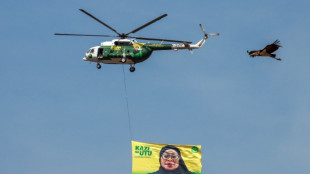
-
 G7 meets on countering China's critical mineral dominance
G7 meets on countering China's critical mineral dominance
-
Trump hails tariff, rare earth deal with Xi
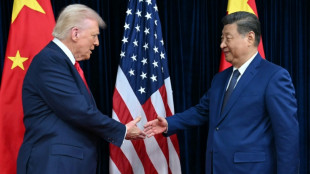
-
 Court rules against K-pop group NewJeans in label dispute
Court rules against K-pop group NewJeans in label dispute
-
India's Iyer says 'getting better by the day' after lacerated spleen
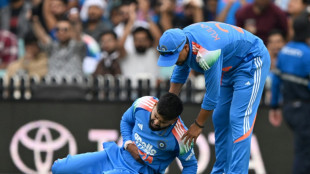
-
 Yesavage fairytale carries Blue Jays to World Series brink
Yesavage fairytale carries Blue Jays to World Series brink
-
Bank of Japan keeps interest rates unchanged

-
 Impoverished Filipinos forge a life among the tombstones
Impoverished Filipinos forge a life among the tombstones
-
Jokic posts fourth straight triple-double as Nuggets rout Pelicans

-
 UN calls for end to Sudan siege after mass hospital killings
UN calls for end to Sudan siege after mass hospital killings
-
Teenage Australian cricketer dies after being hit by ball

-
 As Russia advances on Kupiansk, Ukrainians fear second occupation
As Russia advances on Kupiansk, Ukrainians fear second occupation
-
Trade truce in balance as Trump meets 'tough negotiator' Xi

-
 China to send youngest astronaut, mice on space mission this week
China to send youngest astronaut, mice on space mission this week
-
Yesavage gem carries Blue Jays to brink of World Series as Dodgers downed

-
 With inflation under control, ECB to hold rates steady again
With inflation under control, ECB to hold rates steady again
-
Asia stocks muted with all eyes on Trump-Xi meeting

-
 Personal tipping points: Four people share their climate journeys
Personal tipping points: Four people share their climate journeys
-
Moto3 rider Dettwiler 'no longer critical' after crash: family

-
 US economy in the dark as government shutdown cuts off crucial data
US economy in the dark as government shutdown cuts off crucial data
-
Trump orders nuclear testing resumption ahead of Xi talks

-
 'Utter madness': NZ farmers agree dairy sale to French group
'Utter madness': NZ farmers agree dairy sale to French group
-
Samsung posts 32% profit rise on-year in third quarter

-
 30 years after cliffhanger vote, Quebec separatists voice hope for independence
30 years after cliffhanger vote, Quebec separatists voice hope for independence
-
Taxes, labor laws, pensions: what Milei wants to do next
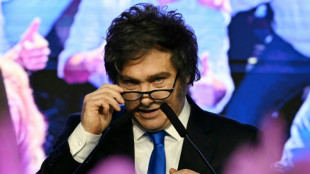
-
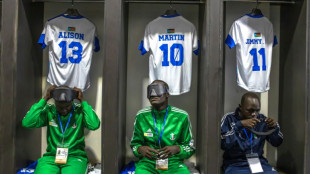 South Sudan's blind football team dreams of Paralympic glory
South Sudan's blind football team dreams of Paralympic glory
-
US says 4 killed in new strike on alleged Pacific drug boat
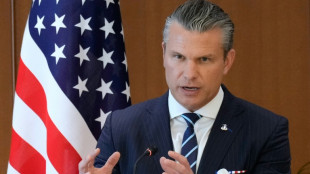
-
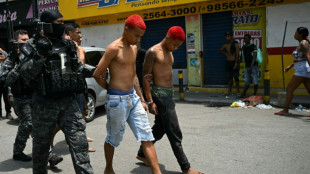 What we do and don't know about Rio's deadly police raid
What we do and don't know about Rio's deadly police raid
-
'They slit my son's throat' says mother of teen killed in Rio police raid
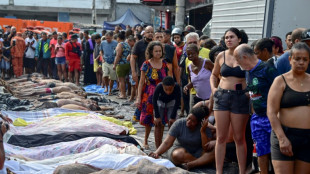
-
 Arteta hails 'special' Dowman after 15-year-old makes historic Arsenal start
Arteta hails 'special' Dowman after 15-year-old makes historic Arsenal start
-
Google parent Alphabet posts first $100 bn quarter as AI fuels growth

-
 Underwater 'human habitat' aims to allow researchers to make weeklong dives
Underwater 'human habitat' aims to allow researchers to make weeklong dives
-
Maresca slams Delap for 'stupid' red card in Chelsea win at Wolves

-
 'Non-interventionist' Trump flexes muscles in Latin America
'Non-interventionist' Trump flexes muscles in Latin America
-
Slot defends League Cup selection despite not meeting 'Liverpool standards'
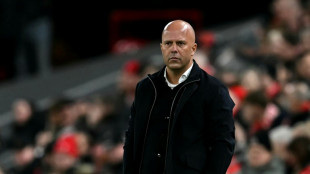
-
 'Poor' PSG retain Ligue 1 lead despite stalemate and Doue injury
'Poor' PSG retain Ligue 1 lead despite stalemate and Doue injury
-
Liverpool crisis mounts after League Cup exit against Palace

-
 Kane scores twice as Bayern set European wins record
Kane scores twice as Bayern set European wins record
-
Radio Free Asia suspends operations after Trump cuts and shutdown

-
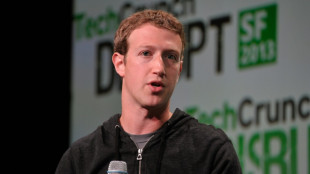 Meta shares sink as $16 bn US tax charge tanks profit
Meta shares sink as $16 bn US tax charge tanks profit
-
Dollar rises after Fed chair says December rate cut not a given
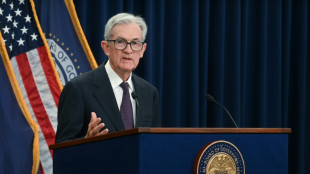
-
 Google parent Alphabet posts first $100 bn quarter as AI drives growth
Google parent Alphabet posts first $100 bn quarter as AI drives growth
-
Rob Jetten: ex-athlete setting the pace in Dutch politics
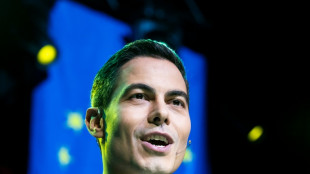

USAID cuts rip through African health care systems
As clouds gather and humidity rises across west Africa, whose annual rains bring an uptick of deadly, malaria-carrying mosquitoes, Musa Adamu Ibrahim, a nurse, is sitting at home, unemployed.
In Nigeria -- home to 30 percent of the world's annual 600,000 malaria deaths -- clinics that once served 300 people a day in the conflict-hit Borno state have abruptly shut down, Ibrahim and other laid-off workers told AFP, following the withdrawal of American funding by President Donald Trump.
"The clinics have been closed and (there are) no more free drugs or mosquito nets," said Ibrahim.
The sudden dismantling of USAID -- the country's main foreign development arm -- is unravelling health care systems across Africa that were built from a complicated web of national health ministries, the private sector, nonprofits and foreign aid.
As the effects of the cuts compound, the resulting damage -- and deaths -- are unlikely to end anytime soon: malaria cases will peak around the end of the rainy season, while threatened American cuts to global vaccine funding would likely be felt later in the year.
In the meantime, the ripple effects continue to spread: alongside laid-off workers, malnutrition clinics have shuttered doors in Nigeria.
Rattled supply chains mean drugs are at risk of being stuck in warehouses in Mali. Children are walking miles to reach care in South Sudan for cholera care and dying along the way, and refugee camps in Kenya are facing medicine shortages.
"People with resources will be able to go and get drugs... but the poorest of the poor, out in remote areas of Nigeria and other parts of sub-Saharan Africa, they're the ones who will be cut off," said Lawrence Barat, a former senior technical advisor for the US President's Malaria Initiative (PMI).
"They're the ones whose children will die."
- Malaria forecasts upended -
During malaria's seasonal peak, Ibrahim once saw clinics he worked at treat 300 patients a week. Fatima Kunduli, another laid-off aid worker in Borno, said her clinic was seeing 60 children per day for malnutrition and malaria care before it shut down.
As downpours progressively cascade across west Africa -- Nigeria's have just started, while Senegal's rains won't arrive until May -- countries that have made in some cases significant progress in stamping out malaria in recent decades will now be doing so without a major financial backer.
Forecasts developed by ministries of health across the continent to plan for the rainy season have deep holes blown in them, said Saschveen Singh, an infectious disease specialist with Doctors Without Borders in France.
The complex mix of funding sources in each nation -- from local governments to internationalnonprofits -- means US programmes worked differently in every country.
In Mali, seasonal malaria chemoprevention drugs given to young children won't have an issue coming into the country -- but American funds were crucial for coordinating their distribution, Singh told AFP.
Meanwhile, in the Democratic Republic of Congo, the USAID-supported PMI was the primary malaria drug and test provider to government health facilities in nine provinces.
"Suddenly, they'll just not have drugs, and it's going to be very difficult for other actors to step in," said Singh, adding her co-workers are "scrambling" to map out where gaps may arise.
- Cholera treatment scaled back -
In South Sudan, USAID-funded clinics have closed amid a cholera outbreak. Children are walking hours to the next closest treatment centre, with at least five dying along the way in the country's eastern Jonglei state, British charity Save the Children reported earlier this month.
In neighbouring Kenya's Kakuma refugee camp, which hosts more than 300,000 people, protests broke out in March when it was announced rations would be lowered, and doctors are running out of medicine.
"All the clinics around, you can get paracetamol. But all other drugs, no," one camp elder, who asked to remain anonymous, told AFP during a recent visit.
At Kinkole General Hospital, in Kinshasa, doctors were recently treating 23 mpox patients isolated in tents free of charge thanks to American support. But workers have no idea if that funding will continue, despite an outbreak that has infected 16,000 and killed 1,600.
"We're thinking a disaster is coming," said Yvonne Walo, an epidemiologist at the centre.
- Potential vaccine funding gap -
The hits to health care systems are set to keep coming.
Washington is reportedly considering pulling back its funding to Gavi, the organisation that procures vaccinations for the world's poorest countries.
Cuts would be almost guaranteed, with Gavi chief executive Sania Nishtar telling AFP that "this is too big a hole to be filled."
If confirmed, John Johnson, a vaccination and epidemic response advisor with Doctors Without Borders, expects programmes to start coming under strain later this year.
In Borno, whose governor recently warned of a resurgence of the Boko Haram jihadist group, Kunduli, the laid-off aid worker, said even with US funding the work was "overwhelming."
Now, "I could only imagine."
T.Ziegler--VB




